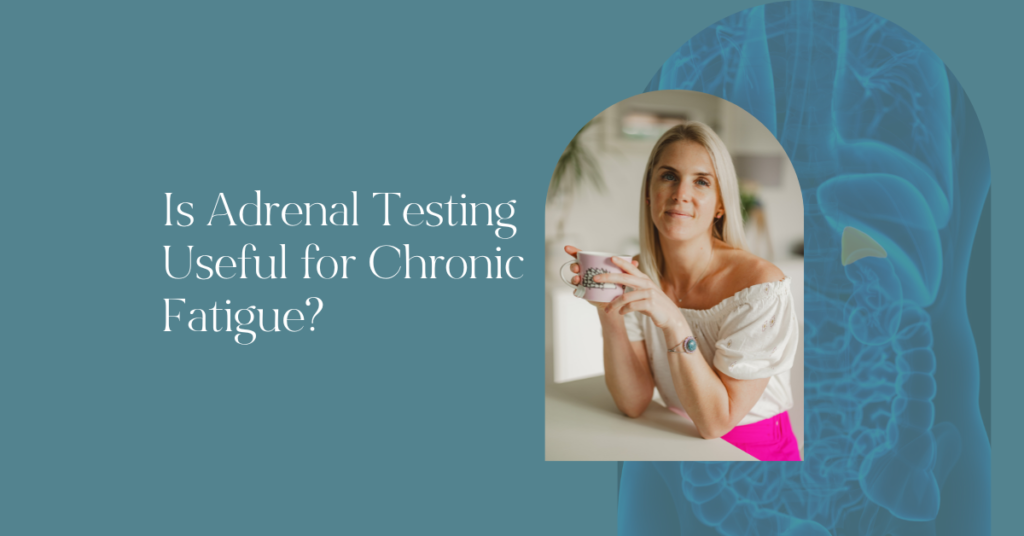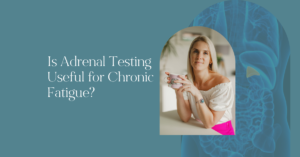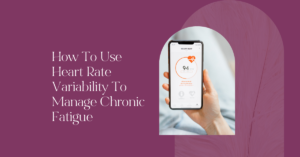Adrenal Testing most typically refers to saliva tests which plot adrenal function across the day. There are some schools of thought that suggest poorly functioning adrenal glands could be an underlying cause in chronic fatigue.
In some cases, adrenal function may be a contributing factor in complex and chronic illness, like chronic fatigue, but not always. Therefore, is adrenal testing useful? Should everyone with fatigue be taking an adrenal test? Those are the questions that I will answer here.
However, before I can answer these questions we need to understand the adrenal glands and related concepts a little better.
Understanding the Adrenal Glands
The adrenal glands are a pair of small, triangular-shaped glands located on top of each kidney. Despite their relatively small size, these glands play a crucial role in the endocrine system, which is responsible for producing and regulating hormones in the body.
Each adrenal gland is composed of two main parts:
Adrenal Cortex
This is the outer layer of the adrenal gland. It produces several important hormones, including:
- Cortisol: Often referred to as the “stress hormone,” cortisol helps regulate metabolism, immune function, and the body’s response to stress.
- Aldosterone: This hormone helps control blood pressure and electrolyte balance by regulating the levels of sodium and potassium in the body.
The production of these hormones is regulated by negative feedback loops controlled by hormonal signals from the hypothalamus and pituitary gland in the brain.
Adrenal Medulla
This is the inner portion of the adrenal gland. It produces two major hormones:
Epinephrine (Adrenaline): This hormone is released in response to stress or fear. It prepares the body for “fight or flight” by increasing heart rate, dilating airways, and redirecting blood flow to important organ
Norepinephrine (Noradrenaline): This hormone works in conjunction with epinephrine to prepare the body for stress. It also plays a role in regulating blood pressure.
The production of epinephrine and norepinephrine are controlled by the autonomic nervous system and therefore, dysfunction in the autonomic nervous system may negatively impact the production of these hormones. This may be a common cause of symptoms such as postural orthostatic tachycardia syndrome (POTs).
Cortisol and Energy
Cortisol is an energy liberating hormone. It can act on the pancreas to decrease insulin and increase glucagon which acts on the liver to liberate stored energy in the form of glucose, ketones and fats.
For this reason, low cortisol is often spoken about in the context of fatigue and adrenal testing is popular.
Signs of Adrenal Dysfunction
There can be different stages of adrenal dysfunction broadly categorised as adrenal hyperfunction or adrenal hypofunction.
Adrenal Hyperfunction may be associated with high cortisol and/or epinephrine/norepinephrine output which relates to symptoms such as:
- Difficulty falling asleep
- Feeling wired
- Feeling anxious
- High blood pressure
- High blood sugar
- Weight gain
- Increased thirst and urination
- Increased heart rate
Adrenal Hypofunction may be associated with low cortisol and/or epinephrine/norepinephrine output which relates to symptoms such as:
- Difficulty staying asleep
- Craving salt
- Being a slow starter in the morning
- Afternoon fatigue
- Low blood pressure
- Dizziness when standing
- Afternoon headaches
- Headaches on exertion or with stress
- Hypoglycemia
You may resonate with both the symptoms of adrenal hyperfunction and adrenal hypofunction this could be due to a combination of having low cortisol levels (adrenal hypofunction) but higher levels of epinephrine and norepinephrine which are governed by the autonomic nervous system. This is where testing may be useful to establish if your cortisol levels are high or low.
But what if you only identify with symptoms of hyper or hypofunction? Does adrenal testing have its use? You might also be asking questions such as:
- How do I test my adrenal function?
- Is this something I need to test?
- What do I do about this?
Adrenal Testing
Cortisol can be tested in blood, urine or saliva. The most reliable test is a saliva test.
There are various testing companies that offer cortisol saliva testing such as Genova Diagnostics and Precision Analytical (UK provider being Regenerus).
If I am going to do a cortisol saliva test with a client, my preference is to ask them to do a saliva test which includes the Cortisol Awakening Response (CAR).
CAR is the peak in cortisol that should happen within 30 minutes of waking. Therefore a saliva sample is taken on waking, 30 minutes after waking and 60 minutes after waking. There should be a 50% increase in cortisol in this time.
Here is an example of a cortisol awakening test for a client with CFS/ME. You can see that their waking cortisol levels were already significantly elevated and their overall increase at 30 minutes was 40%.
Alternatively, here is another example where there was a defined peak but the increase was 158%
Is it useful to understand your CAR?
Before we discuss CAR specifically, it is important to acknowledge that saliva adrenal testing is a snapshot of a moment in time. Adrenal output can vary day to day depending on the circumstances. This means that if you did two tests on days when you were having different experiences, eating different foods or maybe at a different time in your menstrual cycle, you may get a different result.
When it comes to CAR, I am most concerned that a client can produce a significant adrenal output first thing in the morning. As discussed in my previous post on Circadian Rhythms, this is important for the biorhythm of the client and the impact that a healthy biorhythm has on neurochemistry, the immune system and additional hormone signalling.
A CAR of 158% is much better than no CAR or a low CAR because we know that the adrenals are functioning in an appropriate rhythm.
Someone with a low CAR is likely to be someone who really struggles with their morning energy, they may have problems with blood sugar control and be prone to hypoglycemia. If a client presents with these symptoms and we suspect that adrenal function may be a problem, we may consider testing.
What to do if your CAR is low?
If your CAR is low, it is vital that we restore its function. There are 4 things that need to happen within 10-30 minutes of waking:
- Exercise
- Sunlight / Bright Light
- Licorice Root
- Cold Shower
Someone with a low CAR will likely feel tired and unmotivated in the morning and taking these actions will require a bit of willpower and determination. Here are the details:
Exercise
Not everyone with fatigue can exercise so please apply common sense. If you are able to complete some form of exercise or movement, do so at the highest intensity that is safe for you for 10 minutes.
Sunlight or Bright Light
Irrespective of your CAR, we should all be viewing sunlight first thing in the morning as follows:
- 3 minutes on a sunny day
- 10 minutes on a partly cloudy day
- 20-30 minutes on a cloudy or rainy day
If you wake up before sunrise, expose yourself to bright lights or ideally a 10 000 LUX light and then get outside later in the day.
Cold Water
Cold exposure may offer a wide range of health benefits. In addition to being a hormetic stressor, which means it can induce an anti-inflammatory effect on the body it may:
- Raise epinephrine and norepinephrine (adrenalin and nor-adrenalin) – both of which may increase energy and focus
- Improve resilience and “grit” – because we are encouraging ourselves to do something uncomfortable which may then carry over to other scenarios in our life.
- It may cause a prolonged increase in dopamine – up to 250x our baseline – which can improve energy, attention, focus, mood and internal drive
- In the short term it may increase metabolism, as we burn calories to keep ourselves warm. Frequent cold exposure may support the conversion of white fat to brown fat which improves cold tolerance and may increase metabolism longer term.
The recommended cold exposure is 11 minutes per week. I recommend starting small, for example a 30 second shower, and building up to 90 seconds per day.
Licorice Root
The active component in licorice root may slow the breakdown of cortisol by inhibiting the enzyme 11-beta-hydroxysteroid dehydrogenase which converts cortisol to cortisone. This is best taken under the care of an appropriately trained practitioner as there can be risks involved such as increased blood pressure.
Conclusion on CAR
Testing CAR can be useful, especially if someone struggles to wake up and takes a long time to get going in the morning. As a practitioner, this can be the most useful part of an adrenal stress profile, but sometimes, other parts of the profile can be useful too.
Complete Adrenal Profiles
Most testing companies offer an adrenal profile which includes the CAR and a further 4-5 measurements plotted across the timeline of your day. Although this can be helpful in some cases, clinically I find these less useful due to the variability in profiles and how they correlate with symptoms and the fact that they can vary greatly depending on the stimuli of each day.
For example: this is someone with chronic fatigue symptoms
This is also someone with chronic fatigue symptoms
In personal and professional clinical experience I have found these types of testing less helpful and instead it is more helpful to assess clients symptoms and take the approach whereby we aim to support the bigger picture of the stress load on the body.
Restoring Adrenal Function
If you resonate with the symptoms of adrenal hypofunction and /or adrenal hyperfunction and/or you have tested your adrenal profile which suggests that you are experiencing adrenal hypofunction and /or adrenal hyperfunction, what can you do about it?
The main factors in restoring adrenal function include:
- Addressing biorhythms and CAR
- Blood sugar regulation and preventing hypoglycemia events, especially if you are someone with adrenal hypofunction (see deeper discussion here).
- Stress Management and Improving Stress Resiliency. This includes:
- Reducing external stressors; setting boundaries and addressing energetically expensive personality traits such as perfectionism, people pleasing, achieving, controlling etc.
- Proper pacing of mental, emotional and physical loads
- Nervous system self care and trauma work which I cover in Nurturing Resilience.
- Eliminating internal stressors e.g. poor digestive health, infections, toxins etc
- Supplementing with Adrenal Adaptogenic Herbs
Beneficial Herbs
- Asian Ginseng
- Ashwagandha
- Holy Basil
- Rhodiola
- Eleutherococcus
- Licorice root for low morning CAR
*all herbs work synergistically so may be better taken together instead of on their own.
Adrenal Autoimmunity
Adrenal autoimmunity is when the immune system produces antibodies to the adrenal glands. Over time this can cause destruction of the adrenal tissue, impacting adrenal function. The end result may be a condition known as Addison’s Disease which is severe adrenal hypofunction.
There are 3 stages of autoimmunity:
- Silent Autoimmunity: when there are antibodies but no symptoms
- Reactive Autoimmunity: when there are antibodies and symptoms
- Destructive Autoimmunity: when there are antibodies and tissue destruction
In the case of Addison’s Disease, someone can lose up to 90% of their adrenal tissue before reaching the point of diagnosis, but what about the people who have lost less? There may be subtle signs of dysfunction, long before anything is considered “wrong”.
These may include:
- Fatigue
- Extreme Muscle Weakness
- Salt Cravings
- Chronic Diarrhoea, Nausea and Vomiting
- Loss of appetite
- Weight loss
- Confusion
- Fainting / Loss of Consciousness (Syncope)
- Low Blood Pressure
- Signs of Dehydration
- Orthostatic Hypotension
- Hyperpigmentation of the skin and buccal mucosa
The test for adrenal autoimmunity is 21-hydroxylase antibodies which is part of the Cyrex Array 5 Autoimmune Screen.
If adrenal autoimmunity is identified, the decision making of the case may change slightly to prioritising immune regulation and preventing tissue destruction and loss of function in the long term. It goes beyond the scope of this post to discuss in detail, but generally speaking these are factors to consider.
- Identify the undiagnosed autoimmunity (Cyrex Array 5)
- Identify the stages of the disease e.g. silent, reactivity, disease
- Identify lifestyle triggers e.g. sleep, exercise and relationships
- Identify dietary protein triggers e.g. gluten, dairy, nightshades, lectins, gluten cross reactive foods, insulin surges
- Identify chemical triggers e.g. pollutants, toxins, chemicals, impaired biotransformation
- Identify antigen triggers e.g. virus, bacteria, parasite, mould
- Identify the breakdown of the immune barriers e.g. gut barrier, lung barrier, blood brain barrier, nasopharynx barrier
- Support immune tolerance e.g. distinguish, downregulate and diversify
- Have strategies that help to recover from flares
Summary and Conclusion
To test or not to test, that is the question!
In my earlier years as a practitioner, well over a decade ago, I did a lot of adrenal testing. In many cases I found this testing helpful, my clients got good results and felt better. But this could have been the benefits of reducing stress and improving blood sugar and food quality, not necessarily adrenal supplements.
Since working more and more with complex chronic illness cases, I find adrenal testing less and less useful. The majority of people who experience a chronic illness are under stress and have been for a long time. It is inevitable that stress management and blood sugar control are going to be important for them and adrenal function may naturally improve as overall health improves without the need for a targetted approach.
When it comes to working on these cases there are often a whole handful of tests I would like my clients to do. But, most of my clients do not have bottomless money pits and therefore, we often have to prioritise the most important tests that will help to move the case along, adrenal testing is usually not at the top of the list.
I would consider adrenal testing if someone is prone to hypoglycemia that is poorly managed despite excellent dietary practises. I might consider adrenal testing if I suspect a low CAR and someone is really struggling in the mornings, however, I may be inclined to suggest the interventions mentioned here first and foremost.










